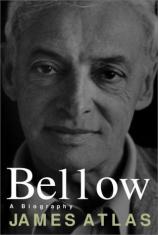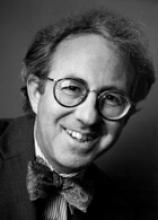Bellow: A Biography
Review
Bellow: A Biography
Augie March, Tommy Wilhelm, Eugene Henderson, Moses Herzog, Charlie Citrine, Artur Sammler, and Dean Albert Corde are just a few of the characters who endure like great trees, giving contour to the landscape of American Literature. James Atlas, whose previous biography DELMORE SCHWARTZ: The Life of an American Poet was nominated for the National Book Award, has recently completed the first comprehensive biography of their progenitor and alter-ego, Saul Bellow.
The winner of three National Book Awards, a Pulitzer Prize, and the 1976 Nobel Prize for Literature, Bellow's life would appear ideally suited for biography --- someday. That Bellow is not only still living but at age 85 has recently fathered a daughter and, with RAVELSTEIN, has published one of his most critically acclaimed novels hardly seems to have discouraged Atlas. Indeed, even though Atlas received his subject's approval, there must have been slight apprehension in a subject who claimed, "I still consider myself a growing tree, and I'm not ready for the sawmill. Biographers...were the shadow of the tombstone falling across the garden." Atlas aptly describes biography as a "process of immersion," and after reading BELLOW: A Biography and reviewing 10 year's worth of acknowledgments and notes, it is easy to agree with him. The result is a stimulating and discerning account that resists the temptation to pull punches. In so doing, Atlas has captured and delicately framed one of this century's standard bearers of intellectual history. It is a feat that might fittingly be described as trying to catch butterflies with a hula hoop.
Atlas accomplishes a novelist's recreation of eras, places, and historical events. His vast portraits of Montreal, Chicago, bohemian New York of the 1940s, and the turmoil of the 1960s are replete with careful brushstrokes: a great sensitivity to the immigrant experience, the rendering of the New York intellectuals and their role in bringing the Jewish experience into the mainstream, his treatment of the student movements and the birth of "cultural relativism" that followed. His methodical progress and narrative skills are necessary tools when studying someone whose life can be generously described as peripatetic. Atlas meticulously tracks Bellow's early career as a gypsy professor and aspiring writer in the United States, followed by his frequent trips abroad: in Paris after the war, Spain during Franco, literary London, the war in Israel, Sweden to accept the Nobel Prize. With precision and grace, BELLOW takes us on a journey through the cultural history of our century, using Saul Bellow as our tour guide. Not even the smallest details are overlooked along the way. Such attention to particulars sometimes strays into the perverse, specifically with the description of a therapist's regimen that had Bellow sitting naked in a wooden box and achieving emotional release by stuffing a handkerchief in his mouth and screaming. These instances are the exception and do not detract from a palpable tension that lies at the core of Atlas's work --- Bellow's personal struggle as an outsider and a victim. "Being a Jew, like being a novelist, confirmed Bellow's status as an outsider, a member of still another beleaguered minority, whose interests he felt called upon to defend." Atlas forcefully addresses these themes and illustrates how they resonate throughout Bellow's life and work.
Atlas has clearly done his homework and should be applauded for his extensive research of Bellow's work. His references to the unpublished manuscript "Zetland" are particularly insightful. Throughout BELLOW, the reader is constantly reminded that "To read his books in consecutive order is to follow the contours of his biography." We meet a man of extremes who grapples with his demons, pen in hand. By means of assimilation, borrowing, appropriating and synthesizing, Bellow forges art. Each novel is dissected, recreating for us the process by which Bellow transmutes his personal caterpillars into butterflies and, often with an unrelenting severity, his personal butterflies into caterpillars. It is during these latter occasions when Atlas seems to take offense and to react almost viscerally by lashing out at his subject. "Keeping himself free from encumbrance was a strategy that was to govern Bellow's life. Whether it was wives, children, publishers, lawyers, friends, or even ideas, he maintained his distance as a way of preserving his fragile sense of self." One cannot help but notice the irony of Atlas treating his subject with similar rancor of which he accuses Bellow. Indeed, Atlas seems comfortable with his role of biographer, "The role verges on the psychoanalytic --- in our effort to elicit testimony that will illuminate our subject's life, we experience transference, deceit, repression." It is these instances in BELLOW where the reader is forced into a diagnostic mood as threads of psychoanalysis and literary analysis become knotted. Fortunately, Atlas is mindful of tempering such aggression with equally valid admiration as when he correctly stresses that it was not only personal experience that Bellow freely appropriated, but the modern European novel, thus imposing a uniquely American idiom on the tradition.
The technique is a success --- a clear demonstration of the commitment and skill of the biographer. BELLOW is an absorbing book, and its hero has been so beautifully framed that one could altogether miss the slender pin through the abdomen.
Reviewed by Joel E. D. Wells on October 17, 2000
Bellow: A Biography
- Publication Date: October 17, 2000
- Genres: Biography, Nonfiction
- Hardcover: 688 pages
- Publisher: Random House
- ISBN-10: 0394585011
- ISBN-13: 9780394585017




